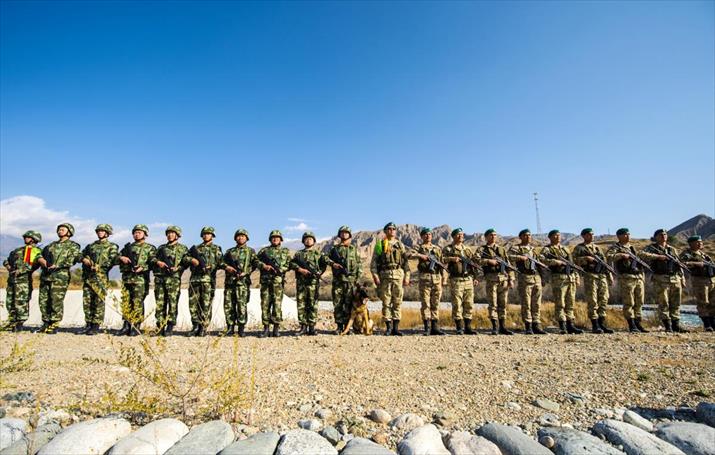| Opinion |
| Sound Security First | |
| The Belt and Road Initiative's implementation calls for a new international security system | |
|
|
 China and Kazakhstan launch the Unity 2016 joint border patrol under the framework of the Shanghai Cooperation Organization on October 13, 2016 (XINHUA)
For a variety of reasons, the national security situations of some countries along the Belt and Road routes are not stable. Though the so-called Islamic State (IS) will possibly be wiped out within two or three years by the joint anti-terrorist efforts of the international community, many IS extremists may flow to other places, with South and Southeast Asian countries as their major destinations. Occasionally occurring political upheavals, religious conflicts and terrorist attacks in these countries have more or less hindered the advancement of Belt and Road Initiative projects. Some projects were even halted due to these reasons. Some international conflicts are also barriers to regional integration promoted by the Belt and Road Initiative, such as the Ukrainian crisis and the India-Pakistan territorial dispute. In addition, at least one large nation outside the region is intentionally sparking tension within the Belt and Road region. For instance, a series of steps the United States has taken in the South China Sea in recent years obviously have the purpose of containing the implementation of the Belt and Road Initiative. What's more, U.S. President Donald Trump's "anti-globalization" policy trend brings more uncertainties to the international security situation. Therefore, some countries along the Belt and Road routes may also be affected. Against this backdrop, security cooperation should be upgraded among countries along the Belt and Road routes by such measures as enhancing transnational anti-terrorist mechanisms and setting up an intelligence-sharing platform and joint emergency forces against terrorism. In addition, following the advancing of interconnectivity of trade and infrastructure in the region, transnational movement of people will become more frequent, which may also bring about more complicated cross-border and organized crimes. Therefore, establishing related safeguard and cooperation mechanisms within the region will also become basic needs. Economic development is the main focus of the Belt and Road Initiative, while achieving it should be based on guaranteed security. To ensure the smooth advancement of the initiative, it has become an inevitable mission for China to build a new international security system centered on the initiative. In the process of pushing forward the Belt and Road Initiative, China intends to work with countries in the region to build a security order on the basis of equality and mutual trust. The existing regional security cooperation mechanisms, including the Shanghai Cooperation Organization (SCO) and the Greater Mekong Subregion Economic Cooperation Program, should be well employed. Security cooperation between China and Central Asian countries under the SCO framework and the new China-ASEAN security cooperation platforms is different from the U.S.-led security alliances, such as NATO and the U.S.-Japan-South Korea military alliance, which are based on U.S. hegemony. Against the backdrop of a weakening of the West-dominated global security order, the emergence of a new security system is gradually becoming an important requisite for safeguarding regional stability and world peace. Even to this day, because of concerns about misunderstandings from other countries, China has been keeping a low profile in international security and military cooperation. Nevertheless, as the implementation of the Belt and Road Initiative advances, it has actually become an important responsibility for China, as a major nation, to provide public goods for maintaining security for regional countries along the Belt and Road. It has also become a common expectation of countries involved, which are hoping to harvest peace, stability and prosperity from the initiative's implementation. Copyedited by Chris Surtees Comments to liuyunyun@bjreview.com |
|
||||||||||||||||||||||||||||||
|